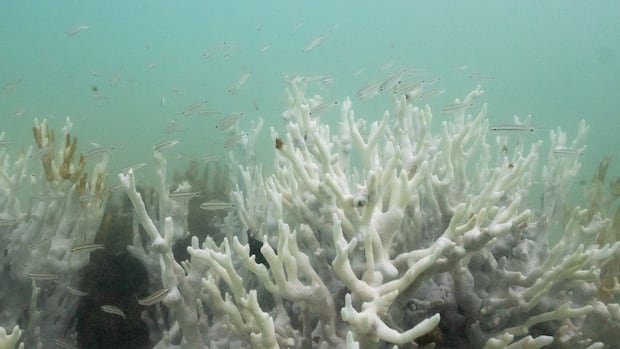Global warming is progressing towards critical thresholds faster than anticipated, leading to a near irreversible decline of the world’s coral reefs, signifying a significant tipping point in the collapse of climate-driven ecosystems as per a report released by 160 researchers globally. The report, known as the Global Tipping Points report, consolidates pioneering research to identify points of no return and has been issued just ahead of the COP30 climate summit slated to take place in Brazil near the Amazon rainforest.
The report highlights the jeopardy faced by the Amazon rainforest system, which may collapse once the global average temperature surpasses 1.5 degrees Celsius due to deforestation rates, indicating a lower threshold than previously estimated. Additionally, there is a looming threat of disruption to the Atlantic Meridional Overturning Circulation (AMOC), a major ocean current crucial for mild winters in northern Europe, if temperatures continue to rise.
Tim Lenton, an environmental scientist at the University of Exeter and the lead author of the report, expressed concern over the rapid changes occurring in certain climate and biosphere aspects. Despite this, Lenton acknowledged positive developments in phasing out fossil fuels responsible for climate change, with renewable energy sources surpassing coal in electricity generation for the first time this year, according to data from the non-profit think-tank Ember.
The experts emphasized the need for urgent action to mitigate climate change and reduce carbon emissions at the upcoming COP30 in November. They noted the alarming pace of environmental changes, with global temperatures already exceeding 1.3-1.4 degrees Celsius above pre-industrial levels, based on data from UN and EU science agencies.
The past two years have been recorded as the warmest on Earth, characterized by marine heat waves that severely impacted 84% of the world’s reefs, causing bleaching and coral death. Coral reefs, supporting a quarter of marine life, face a critical situation requiring substantial climate action to revert temperatures back to only 1 degree Celsius above pre-industrial levels for potential recovery.
Pep Canadell, a senior scientist at Australia’s CSIRO Climate Science Centre, emphasized the escalating negative impacts of climate change outlined in the new report, emphasizing the urgent need for increased climate action each year.
This comprehensive report underscores the escalating urgency to address climate change and its far-reaching consequences on global ecosystems.

